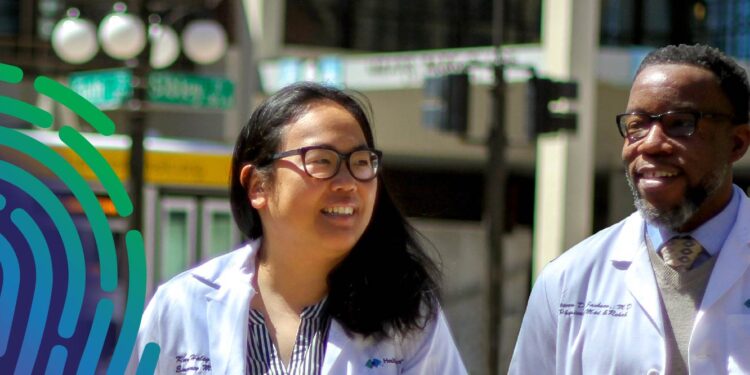It took Dr. Anthony Williams a very long time to get to the place he’s in his journey. He started out as a chemical engineering pupil in Oklahoma, and after he graduated, it will be seven years earlier than he migrated north to Minnesota for medical faculty. And it wasn’t till the finish of residency that he started mixing his lived experiences along with his underlying ardour for writing and storytelling.
But now, 5 years out of residency, Dr. Williams has absolutely realized and mixed his passions along with his vocation. Not solely is he an inside drugs and pediatrics hospitalist at Regions Hospital, however he’s additionally the affiliate program director for the Regions med-peds residency and affiliate director of the Center for the Art of Medicine.
Dr. Williams is deeply occupied with the locations the place his work and lived expertise intersect with points of variety, fairness and inclusion (DEI). So on this episode, he shares some of his experiences, classes he’s realized alongside the manner and recommendation for locating one’s place in DEI work. Listen to the episode or read the transcript.
Find what feeds your soul
Dr. Williams acknowledges that DEI work can appear overwhelming from the outdoors. There are so many ranges it may well happen on – from legislative initiatives and institutional insurance policies to interpersonal relationships. And we aren’t all lower out for the identical work. Dr. Williams is aware of that, for himself, political advocacy wouldn’t be match. He wouldn’t be capable of maintain it.
Given this, Dr. Williams’ recommendation for individuals who need to make issues higher is easy and intuitive: have a look at what you already do. When no person is watching, whenever you aren’t being pushed or pulled by exterior forces, what do you gravitate towards? For Dr. Williams, it’s writing and mentorship. He mentored individuals in undergrad and medical faculty, and he is aware of he’d at all times be writing and creating narratives it doesn’t matter what else he did. These varieties of work are naturally sustainable for him, and they’ve introduced him to the place he’s in the present day.
Change your mindset
Once you recognize what variety of work you need to do, it’s important to discover a area the place it’s happening. Dr. Williams believes that individuals tend, consciously or subconsciously, to take a look at getting into DEI work as a person effort. They have a look at it as themselves going up towards the massive concepts like racial biases or health fairness, and with that, they develop into involved with failure. Maybe they’ll do one thing incorrect and trigger hurt or overstep their bounds.
Dr. Williams stresses the significance of getting out of this individualized mindset. At the finish of the day, this work isn’t about us as people – it’s about the objective of the work, which is sort of at all times communal. We every might deliver sure strengths to the desk, however we’ve to simply accept that we’re all restricted in our experiences and information, and we’ve to be open to studying.
Dr. Williams is aware of this firsthand: he’s completely comfy discussing points of race in drugs, however when it got here time to work on a mission associated to incapacity, he was now not in his space of experience. He needed to embrace the discomfort of being uninformed, sit again and ask questions. In different phrases, he needed to observe cultural humility.
Remember we’re all human
The mindset that Dr. Williams encourages for approaching DEI work isn’t solely helpful there – it may well additionally prolong to our each day lives and work. This, specifically, is the place Dr. Williams’ ardour for narrative comes into play.
Rather than strategy his sufferers as a consultant of medical information, he places his humanity first. He seems to be for locations the place his lived expertise resonates with that of his sufferers and lets that resonance lead. That manner, when the dialogue reaches matters like therapies and suggestions, his sufferers are extra receptive. They know Dr. Williams is somebody with a narrative like theirs and that his recommendation is coming from the coronary heart. Dr. Williams additionally is aware of he can’t obtain that dynamic with each affected person. But he nonetheless does his greatest for them and will usher in one other supplier if he thinks they’ve a greater probability of connecting.
Dr. Williams’ experiences present us what good work is really about: connection. And connection requires empathy – definitely for others, but in addition for ourselves. When envisioning the work we need to do, we’ve to be variety and affordable about what we are able to do, what our strengths are and the place we’re restricted. This self-knowledge exhibits us the place we may help, and the place we are able to study. To hear extra about Dr. Williams’ perspective, expertise and tasks, take heed to this episode of Off the Charts.



















Discussion about this post